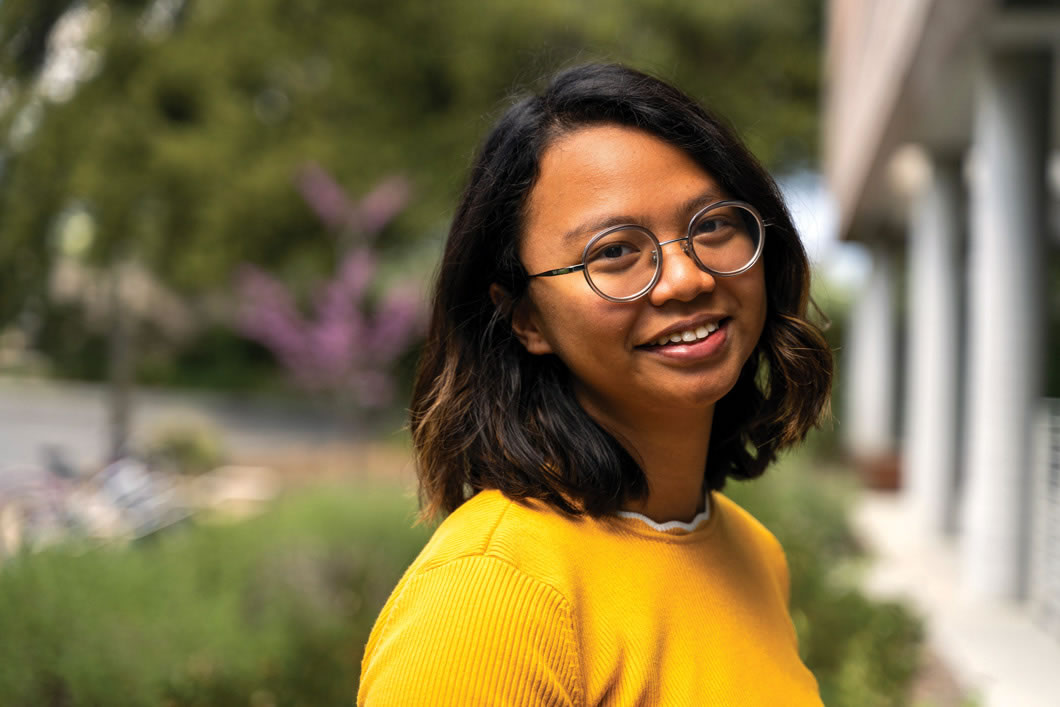Passport to STEM
Alumna becomes international STEM advocate
During fall 2018, Annisa Dea ’17 spoke about her personal journey during an International Women in STEM panel hosted by HMC and Keck Graduate Institute.
“I was motivated to talk in this panel because I always felt blindsided by new challenges I faced as a non-citizen in the U.S. throughout my time as an undergrad,” says Dea, who is from Indonesia. “I thought the shock would end after orientation and frosh year, but between taxes, visas, fellowships and employment authorizations, I was always surprised by some extra hurdle I would have to tackle as an international student.”

Dea majored in biology and chemistry at HMC and graduated with distinction. She did her senior thesis with Jae Hur, assistant professor of biology, studying aging in fruit flies (Drosophila). “This was when I first realized what a powerful tool model organisms—such as fruit flies, mice, yeast, etc.—served in figuring out the mechanisms of our everyday biological actions, whether it be aging or sensing.”
Now a genetics research assistant in the laboratory of Elizabeth Hong at Caltech, she investigates the mechanisms behind neural wiring of the Drosophila olfactory circuit. Understanding the logic of how sensory inputs are combined by higher-order olfactory neurons is at the heart of understanding how a biological system extracts meaningful information from external cues to guide behavior. Dea is responsible for all aspects of this project, from designing and executing experiments, to analyzing data and drafting figures for potential future publications.
Her inspiration to pursue a career in the STEM fields came from her mother, an electrical engineer, who was often the only woman in her work environment. Similarly, Dea was the only girl in her high school physics class. “I remember already feeling pressure to prove myself in this male-dominated space,” she says. “It’s really a shame because there’s so much in diversity that all STEM fields can benefit from.”
The principal investigator in the Caltech lab where Dea works is a woman, as are many of Dea’s lab colleagues. This is an anomaly. “I have noticed that female scientists tend to get talked over a little more than the men do. But if you’re brainstorming, there’s no wrong or right answer! I’ve often felt the need to be completely certain of what I want to say before I say it and the need to prove myself a little harder than a man would, to be more sure of my rationale.”
Dea says she sees the gender gap in STEM fields slowly diminishing as more female faculty are hired. However, she acknowledged, “We still have a lot of work to do. Making STEM education more accessible and welcoming for women is key, like encouraging and, more importantly, supporting young girls’ involvement in currently male-dominated STEM after-school activities. We should work to maintain this support from the elementary school level all the way to the faculty level.”
Steady encouragement is important, Dea believes. She cites a 2018 study by Microsoft that included more than 6,000 girls and women between the ages of 10 and 30 from across the U.S. The study report highlighted ways to better support girls and young women in STEM, including increasing the number of STEM mentors and role models— including parents—to help build young girls’ confidence that they can succeed in STEM.
As Dea furthers her career in research, she hopes to continue paving the way for more female involvement in STEM and breaking away from outdated stereotypes. Next year, she begins her PhD in molecular and cellular biology. She will utilize tools in genetics, biochemistry and computational biology to investigate various molecular mechanisms in model organisms. “I hope to become a professor in a small liberal arts college (like Harvey Mudd!) where I can focus on teaching and research mentorship,” she says.
Dea has had some difficulty finding funding opportunities because she’s not eligible for certain grants that require U.S. citizenship, but she’s working through this and other challenges with a strong support system.
“Evelyn Real [HMC program manager for international students and scholars] has been my lifesaver in navigating all my logistical battles as an international student, both during and after Mudd,” says Dea, who developed a close network of international student-friends while at Mudd. “Currently, we’re trying to figure out the visa transitions from working to going back to school!
“I know they’ll always have my back no matter what new roadblock we face.”